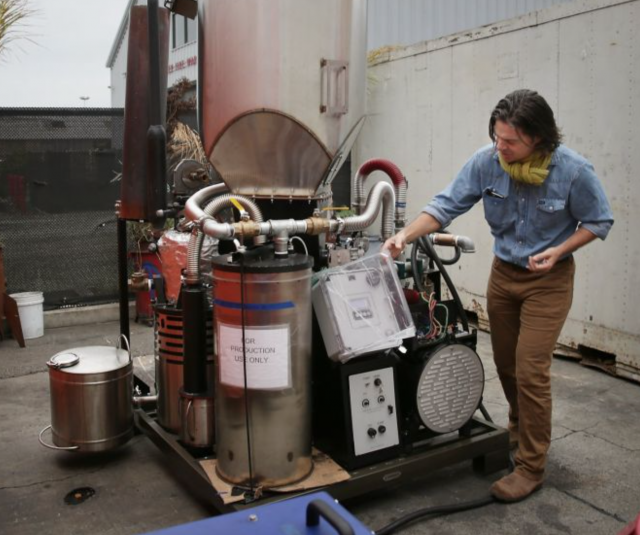NEWS Meet the Berkeley burners trying to hack climate change
Meet the Berkeley burners trying to hack climate change
The birthplace of a machine that could bring clean power to the developing world and knock a tiny dent in global warming looks like a junkyard on the edge of a port.
Old shipping containers and metal scraps crowd the West Berkeley lot of All Power Labs. Prototypes of the company’s products stand watch over the front gate like rusted crows. Stray cats patrol the grounds, including the drafty former auto shop that the startup calls home.
“That’s a few thousand dollars of bad decisions, there,” said Tom Price, All Power’s director of strategic initiatives, pointing to a heap of discarded stainless steel. He shrugs. “Make it, break it, fix it, repeat.”
That approach has produced the Power Pallet, a squat contraption that generates electricity from corn cobs, wood chips, coconut shells and other kinds of cheap, dense biomass. Although it costs $24,000 to $34,000, the Pallet can churn out electricity for less money than the diesel generators that power businesses across the developing world, while coughing up less pollution.
And when used properly, the Pallet is “carbon negative,” pulling more heat-trapping carbon dioxide out of the atmosphere than it pumps back in.
First, Burning Man
Its very existence is almost an accident. Years ago, the tinkerers who would eventually found All Power were using the lot off Ashby Avenue for other purposes — building flame-throwing robots for Burning Man. Berkeley officials objected and convinced Pacific Gas and Electric Co. to cut the power. As a result, Jim Mason, All Power’s CEO, developed a keen interest in generating electricity off the grid.
“We got shut off and decided to hack climate change,” Price said.
Now All Power has morphed into one of the Bay Area’s unlikeliest exporters, installing 700 machines in more than 30 countries worldwide. Its 30 employees assemble one or two Pallets each week, all in Berkeley.
And All Power is one of a handful of American companies displaying their products at this week’s international climate conference in Paris. The long-awaited meeting to hammer out an agreement on global warming will include an expo of emission-cutting technologies, including the Pallet.
“We can pave the planet with solar panels, and it won’t reverse climate change,” said Price, who plans to fly straight from Paris to Liberia for the company’s next installation. “We need to take the carbon out of the atmosphere.”
Conference delegates committed to the fight against warming may prove a more receptive audience than Bay Area venture capitalists.
VCs not buying
Since it incorporated in 2008, All Power has survived almost entirely on its founders’ money, plus Pallet sales. Total funding has been in the ballpark of $2 million, Price said. Now, the company is trying to raise its first $5 million round of financing from VCs, who like big returns, prefer software to hardware and yearn to find the next Uber.
“They’ll say, ‘Let me get this straight: You want to build a machine, in Berkeley, and ship it across the world, to poor people? Good luck with that,’” Price said.
The Pallet uses gasification, a process more than a century old, that subjects carbon-rich organic material to high heat with limited oxygen. Price likens it to lighting something on fire, then choking off the air.
The heated material gives off burnable gases that the Pallet feeds into a four-cylinder engine to generate electricity. What’s left of the original material becomes biochar, which can be mixed into soil as fertilizer.
That waste product — biochar — is how the Pallet achieves carbon-negative status. The plants that produce fuel for the Pallet suck carbon dioxide out of the atmosphere. Super-heating that fuel within the machine releases most of the carbon, but not all of it. Between 5 and 10 percent stays in the biochar. Mix the biochar into a farm field, and the carbon gets locked away, out of the atmosphere.
One Pallet installed in Uganda illustrates the cycle. It supplies electricity to a flour mill for maize farmers. Their leftover cobbs, in turn, supply the Pallet’s fuel. The biochar serves as fertilizer.
Many companies have focused on powering the developing world with solar.
San Francisco’s d.light, for example, sells solar-powered lamps in Africa and Asia. But d.light focuses on individual households and small businesses, many of which have not had electricity.
“It is one of the huge energy success stories at the individual level, but it’s hard to make that scale,” said Dan Kammen, head of UC Berkeley’s Renewable and Appropriate Energy Laboratory.
In contrast, the larger businesses and schools targeted by All Power need more juice, and they already have ways of getting it — typically, a diesel generator. Dependent on highly variable prices for fuel, they tend to produce electricity for 40 to 70 cents per kilowatt-hour in Africa, according to Price. The Power Pallet can generate electricity at 10 cents per kilowatt-hour.
Big backers
Kammen, who also used to serve as the World Bank’s renewable energy czar, saw enough promise in All Power’s technology and economics that he joined the company’s board this year. So did Tom Dinwoodie, a pioneer of the Bay Area’s clean-tech industry who founded solar company PowerLight Corp. in Berkeley 25 years ago.
“We have a billion and a half people in the world with no electricity and maybe even more relying on diesel generators, so it’s a huge potential upside,” Kammen said. “Without what All Power’s got — real units being shipped every week, and different versions out there in the field — it’s really hard to figure out what’s going to work.”
David R. Baker is a San Francisco Chronicle staff writer. E‑mail: dbaker@sfchronicle.com Twitter: @DavidBakerSF


You must be logged in to post a comment.